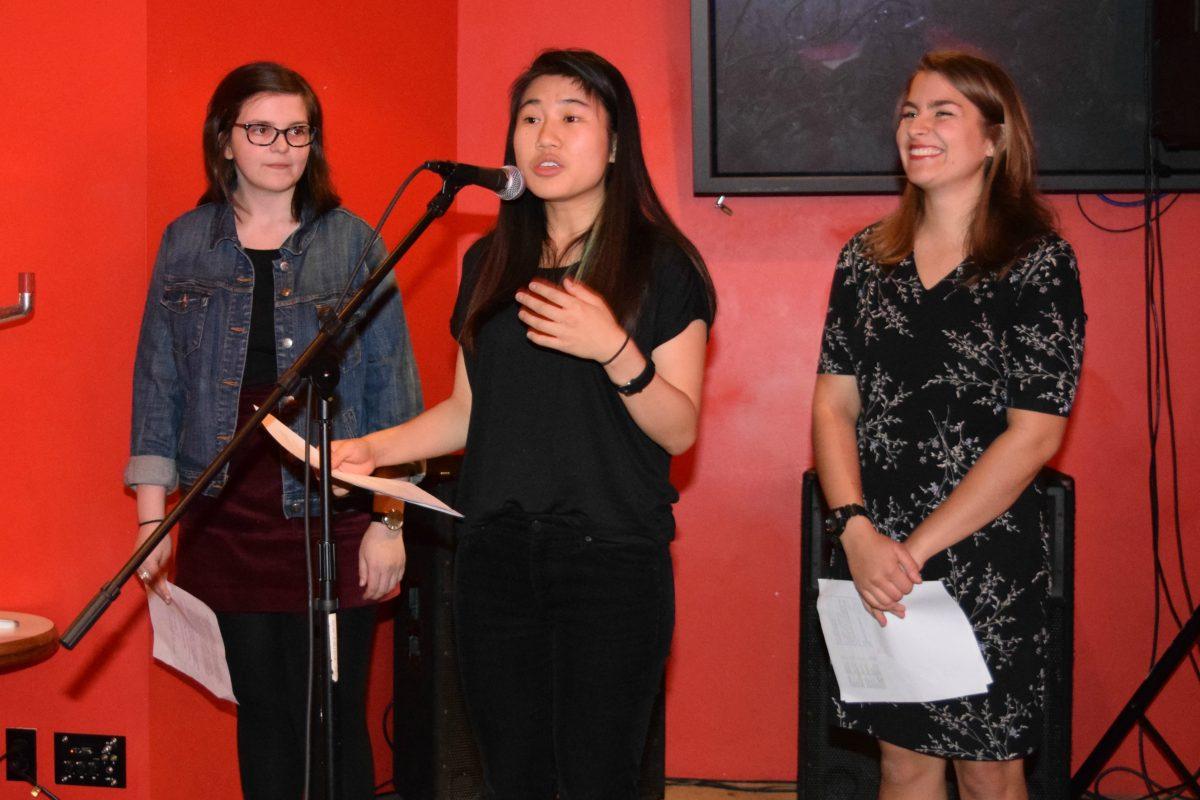In the past few semesters, open mic nights have popped up as a type of event on campus, offering students the chance to voice their opinions and experiences on a variety of topics.
Wellesley Out Loud, a college organization dedicated entirely to writing and performing poetry, has been involved in many of these open mic events, as it frequently collaborates with other on-campus organizations to plan and run them. In past semesters it has collaborated with various organizations and this year the group is opening up to suggestions from its members as to which organizations it should collaborate with and what topics it should feature.
According to Jamila Miller ’18, copresident of Wellesley Out Loud, the group sometimes has up to 14 performers for its events and can fill a small venue.
“We pack the pub very frequently with our open mics. We’re working on getting a larger space and larger numbers, just so that we can reach out to more of the campus, which I’m doing [by] collaborating with more people this year,” Miller explained.
Miller believes that poetry is an important and powerful way for various students to share their experiences.
“We are working on collaborating with more cultural orgs, with more mental health organizations just to get the word out about having a safe space to talk about your experiences,” Miller said. “Whether it’s just being a POC or being LGBTQIA+, we want to be able to have an open forum for people to talk about their life experiences and perform if they want to.”
In addition to holding their own open mic events on campus, some members of Wellesley Out Loud travel to Boston to perform at other venues that also hold open mic events, such as the East Meets West bookstore.
Ally Ang ’17 has performed some of their own poetry at the bookstore, where they have open mics the second Friday of each month. They recently served as the featured poet at one of these open mic nights this month.
“That’s how I really started finding an artistic community—through meeting other people at open mics who also go and perform. It is a really needed space through which people can express themselves,” Ang explained.
Ang is not a part of Wellesley Out Loud, mostly for stylistic reasons, but wholeheartedly supports the group and its purpose. “I think they’re awesome and I’m good friends with a lot of the people in Wellesley Out Loud, but they’re more focused on slam poetry and spoken word and even though I do perform at open mics and stuff I do write more for the page,” Ang said.
Ang has always tried to write poetry but really began working seriously on their craft two or three years ago. Their work is generally somber and covers being a person of color, being queer and being the child of an immigrant, among other subjects. For them, the process of reading and sharing can be very emotional, but also very rewarding.
“It’s still very frightening, especially because I’m more someone who writes more for the page and I can kind of almost hide behind that and there’s something so much more vulnerable about standing up in front of an audience and reading your piece to them rather than writing it and putting it out there for them to read,” Ang explained. “But it can be a very healing thing too, if you’re in a community that’s very supportive, just to be able to share.”
The final part of Wellesley Out Loud’s programming has to do with the writing process. The group finds that holding informal writing sessions to allow writers to receive feedback from one another.
“We just sit and write together and bounce ideas off of each other. We have a very non-judgemental space, unless you just want feedback or you just want to share,” Miller said. “It’s a really welcoming space for people to come and just hear other people’s poetry and just be around good company and people who like to do the same things as you,” she added.
Ultimately Miller believes that open mic nights can bring to light perspectives that students might not otherwise consider.
“Wellesley is a diverse community and having an open mic allows people to get up and talk about that. It opens up this world of different experiences and [allows] you to see that even though these people seem to be the same, they may have gone through different things in their lives,” Miller concluded.






